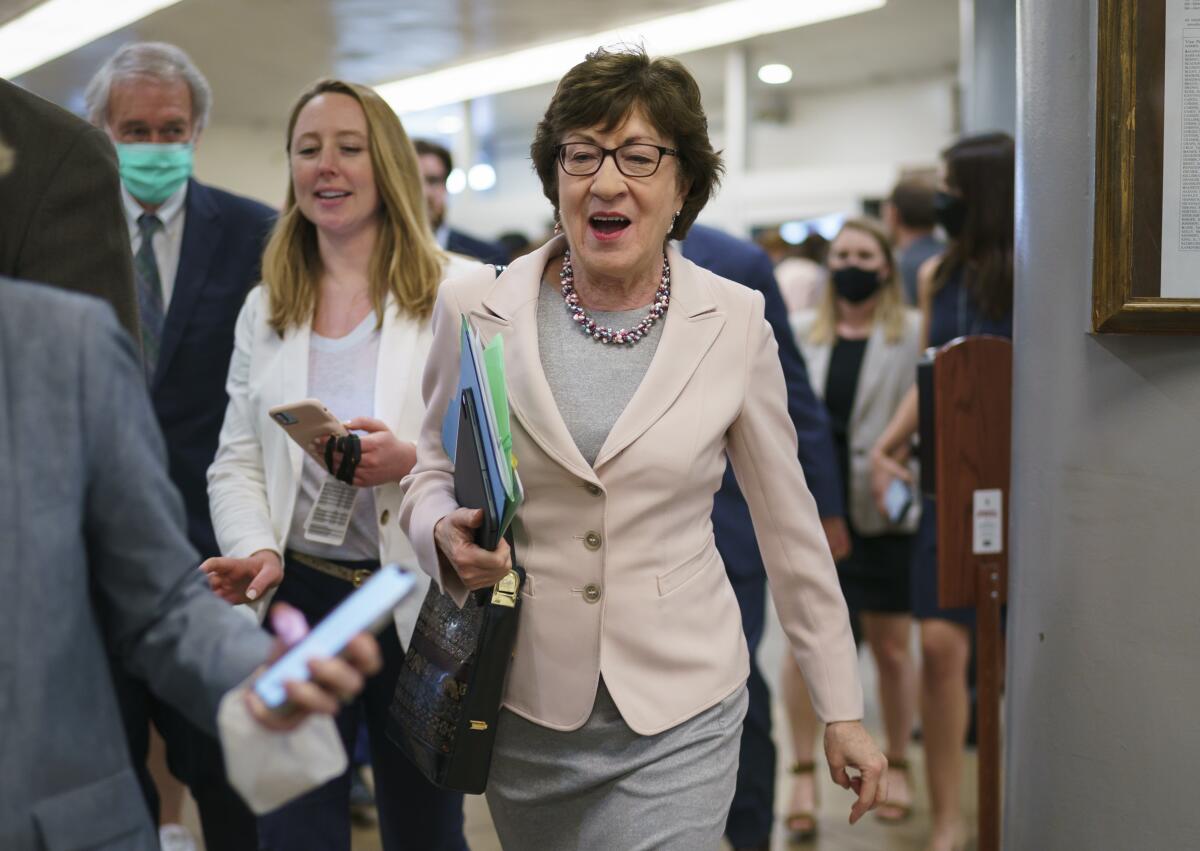Sen. Susan Collins won’t support abortion rights bill

- Share via
WASHINGTON — As Democrats consider legislation to respond to a new Texas state ban on abortion after about six weeks of pregnancy, they have lost the support of one of the few remaining Republicans who support abortion rights.
Sen. Susan Collins (R-Maine) said Tuesday she opposes the Democrats’ bill, which would prohibit states from enacting restrictions on abortion through fetal viability.
The House is expected to approve the bill Friday. In the Senate, Democratic leaders are considering whether to bring it to a vote.
Democrats, led by bill author Sen. Richard Blumenthal of Connecticut, say their legislation would codify the Supreme Court’s Roe vs. Wade decision legalizing abortion.
But in a brief interview, Collins said the bill goes further than that by interfering with existing law that ensures health professionals who object to abortion are not required to participate in it.
“I support codifying Roe. Unfortunately the bill … goes way beyond that. It would severely weaken the conscious exceptions that are in the current law,” Collins said, adding that she found parts of the bill’s language “extreme.”
Collins said the bill would weaken the Religious Freedom Restoration Act, which protects a person’s ability to exercise their religion. She cited the past support for the act by Majority Leader Charles E. Schumer (D-N.Y.) and President Biden when he was in the Senate.
“This ‘carve out’ would be unprecedented, and I do not believe it is necessary to codify Roe,” she said in a follow-up statement.
Collins said she is talking with other senators on a potential bill that “truly would codify Roe.”
The key provision of the Democrats’ bill is a ban on states prohibiting or interfering with abortion through viability. It also attempts to respond to several state laws that abortion rights supporters say limit access to the procedure, such as prohibiting states from requiring physicians to conduct extraneous tests or hold credentials at a nearby hospital before providing an abortion.
The Maine Republican’s opposition to the Democrats’ bill is likely to further fuel liberals’ distrust of Collins, who is one of only two remaining Republicans in Congress who support abortion rights, along with Alaska Sen. Lisa Murkowski.
There is lingering hostility from liberals over Collins’ vote to confirm Supreme Court Justice Brett M. Kavanaugh. He voted in favor of the Supreme Court’s decision to allow the Texas law to take effect and is viewed as a likely vote to undermine Roe.
Collins defended her support for Kavanaugh. “People ought to read what the decision actually said. It said there’s serious constitutional and procedural issues which clearly the court is going to take up,” Collins said. “I think we need to wait and see what happens.”
The Democrats’ bill, if brought to the Senate floor, faces certain defeat. It would need 60 votes to overcome a GOP filibuster.
Democrats have 48 cosponsors in the Senate for the bill. Sen. Patty Murray (D-Wash.), a member of the Democratic leadership, said she is “counting every vote.”
Though it remains unclear whether the legislation would even achieve a simple majority of 50, some abortion rights supporters, including Blumenthal, are pushing for a vote to force senators to go on the record on abortion rights.
Two Democrats — Sens. Bob Casey of Pennsylvania and Joe Manchin III of West Virginia — have not signed on. Casey called the Texas law “obviously objectionable for a lot of reasons,” but said he hasn’t yet taken a position on the Blumenthal bill. “I’ve just begun to look at it,” he said.
Manchin strongly opposes abortion, and abortion rights advocates do not consider him a likely supporter of the bill. His office did not reply to a request for comment on his position.
Democrats are also hoping to pick up support from Murkowski. She said she’s “looking at” the bill and indicated she has yet to take a position.
More to Read
Get the L.A. Times Politics newsletter
Deeply reported insights into legislation, politics and policy from Sacramento, Washington and beyond. In your inbox three times per week.
You may occasionally receive promotional content from the Los Angeles Times.











